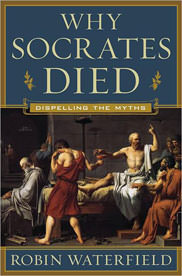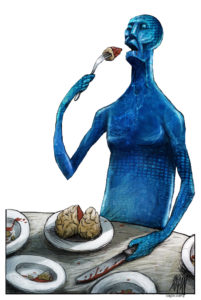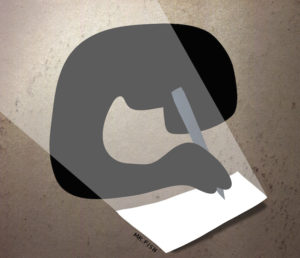Frederic Raphael on Socrates
Was Socrates an atheist, a guru to a strange sect and an elitist corrupting the youth of a democratic Athens defeated in the Peloponnesian War, as his accusers successfully charged? A new book by Robin Waterfield seeks to dispel the myths about “Why Socrates Died.”A new book by Robin Waterfield seeks to dispel the myths about “Why Socrates Died.”
The execution of Socrates has often been seen as prefiguring the crucifixion of Jesus of Nazareth. Both became emblematic: Democracy would forever be tarnished by the former, the Jews by the latter. It was convenient for reactionaries to make a secular saint of Socrates. He then became a pious reason for denouncing democratic law-making, majority decisions and the political machinery that takes authority away from the best people/people who know best. Philosophers have been regularly contemptuous of the caprices of the masses. Their appetite for certainty gags on the fluctuations of popular taste and the ambiguities of vulgar language. If society were governed by immutably defined concepts, philosophers would be unarguable kings. Considering the world sub specie aeternitatis (Spinoza’s recipe for a life untroubled by futile emotions), they would be able to keep everything precisely as it is, which would be identical with what it should be: the caesura between is and ought would be repaired; paradise regained.
Is it just that Socrates became a poster boy for anti-democrats? He was a participating citizen in democratic Athens, fought in its wars and honored its verdict (instead of going into exile, as his friends could have arranged). He avoided the grand manner and, with a puckishness that can be tiresome, even on the page, insisted that he knew nothing and had no doctrine to propagate. He was at ease in aristocratic company, but he did not belong to it by birth. His father was said to have been a stonemason. Socrates lived frugally and, it may be, on the income of his wife, Xanthippe, whose horsy name implies, so Robin Waterfield tells us, that she came from a classier background than the husband who rarely came home (Roger Scruton’s “Xanthippic Dialogues” is a marvelous exposition of Socrates’ character, and a brilliant parody of Plato, from the point of view of the philosopher’s put-upon wife, who is given a tongue at least as sharp as her husband’s).
Socrates played the simple soul, but he was also a responsible citizen who, on military service, could afford the shield and armor with which the middle class had to supply itself. When he philosophized, it was as an amateur who took care to distinguish himself from the mendicant sophists: They took fees, he never did. Socrates was a long-running, peripatetic chat show. The old academic joke accuses him (and Jesus) of one major mistake: He never published. But if he left no account of himself, he is vividly represented in the works of both Plato and Xenophon. In addition, he was held up to memorable ridicule by Aristophanes, especially in “The Clouds,” a play first produced over 20 years before Socrates was put on trial. The playwright — for whom Plato reserved a privileged cup in his “Symposium” — is alleged to have generated abiding popular animus against the man whom he depicted (contrary to what we know of the authentic Socrates) teaching pupils how to “make the worse appear the better cause.” The satirist’s juiciest targets are generally below the belt.
Keener on award-winning than on truth, Aristophanes made his Socrates the very type of amoral opportunist whom Plato, in his turn, lampooned in the Thrasymachus who puts Socrates on the back foot, in “The Republic,” by defining justice as the “will of the stronger.” After Thrasymachus’ forceful intervention, the whole dialogue turns into an attempt, never quite convincing, to establish what should be true (justice is the reflection of eternal values) against what, in practice, seems to be the case: Those with power administer justice in their own interest.
Socrates described himself as the Athenian “gadfly.” Some years ago, I.F. Stone, an American gadfly who stung only to the right, learned Greek in order to understand what still puzzles Waterfield: why the Athenians made a landmark celebrity, and then a scapegoat, of the cranky troublemaker whose unpaid service to the community was to prod citizens into taking a close look at themselves and their ideas. Socrates also claimed to be “maieutic,” a midwife who helped people in the difficult business of giving birth to the truth.
Xenophon’s account is affectionate and unaffected. A decent right-wing landowner and retired general who made no secret of his admiration for Sparta, Xenophon was obliged to live in exile, once democracy was restored in Athens. He depicts Socrates as sparky and provocative but without any political agenda, a Mr. Chips of the old Athenian school. Plato, by contrast, appropriated him as the spokesman of ideas which, in the end, were too elaborate to fit plausibly in his mouth. When Plato wrote his last major work, “The Laws,” Socrates was replaced by anonymous and notably less entertaining interlocutors.
|
To see long excerpts from “Why Socrates Died,” click here. |
If Plato’s earlier dialogues give the truest impression of the historical Socrates, it seems that his long career as tease and teacher centered on a wish to elicit the essential meanings of words in order that moral standards could be based on eternal Ideas of which our own are only approximations. “The Republic” is an attempt to imagine a society in which morals dominate politics, and a static ideology determines the citizens’ conduct and status (with a nocturnal Gestapo to take out those who disagree). The dangerous consequences of this ambition were spelled out, in a polemical style that affronted Platonists, in Karl Popper’s “The Open Society and Its Enemies.” Robin Waterfield refers to “The Republic” as “magisterial, wonderful,” which conveys nothing of its political menace, its satirical acuteness or its elimination of the arts.Waterfield is more historian than philosopher: He prefers to deal with the political reasons for Socrates’ condemnation. To what degree did Socrates provoke the Athenians to condemn him? Since Socrates is always said to have said that only the “examined life” is worth living, Waterfield tells us that Socrates “would have been the last to leave a cultural icon unexamined, and that is what I do in [my] book.” If what this sentence means is the exact opposite of what Waterfield intends, well, only a purist would allow that to spoil his lively revision of the evidence and, more interestingly, of the historical background to what was, in many respects, a show trial. Socrates stood in for a defendant who was already dead but whom the Athenian demos blamed for everything that had led to the defeat of their city by the oligarchic Spartans: the brilliant, rich and egotistic Alcibiades, the man who made swinging both ways a lifetime’s activity.
That the Athenians had themselves to blame for a number of the decisions which had snatched defeat from the jaws of victory did not make them less vindictive. By 399 B.C., when the trial took place, the city had already begun to recover from the catastrophe of five years before. Defeat had led to the institution of a regime known later as The Thirty Tyrants. It had something in common with Pétain’s Vichy government after the defeat of France in 1940: Democracy itself was said to be the reason for national humiliation. A reactionary oligarchy, backed by the Spartans, the victors in the late war, took over. In Athens, it was led by Plato’s uncle, Critias. Although intelligent (he wrote good tragedies), he made such a hash of government that the Spartans washed their hands of him. He was quite soon evicted and replaced by a democratic regime which, as even Plato acknowledged, showed itself more magnanimous than could be expected of any ancient government. Nevertheless, those conspicuously contaminated by Critias and his friends could hardly expect to escape prosecution by those whose family and friends they had, in many cases, done to death. One of Socrates’ principal accusers, Lycon, had lost his son to the Terror.
Alcibiades was the Golden Boy of the Periclean age; glamorous, wealthy, precocious and promiscuous, he even had his personal goldsmith. The source of his wealth is somewhat mysterious, since his estates, at least in Attica, extended to no more than a hundred acres. Maybe, like his great rival Nikias, with whom he shared command (they were the accelerator and the brake on Athens’ disastrous expedition, in 415 B.C., to add Sicily to its empire), he owned slaves, the energy source of the ancient world, whom he rented out. Just before the fleet set out for Sicily, the Athenians were horrified to wake and find that the herms – ithyphallic statues of the god Hermes – which stood outside almost all their houses had had their phalloi knocked off in the night.
Blame fell on the upper-class clubs, hell-raising fraternities in which the blue-blooded celebrated drunken revels and, it was rumored, mounted the equivalent of Black Masses: satirical versions of the Mysteries, ceremonies of initiation which ordinary Athenians regarded with solemnity. This kind of thing had happened before, so Waterfield says: “we know of five or six occasions when Mysteries were illegally performed, a heady brew of impiety and oligarchy. And the Athenians may well have felt that this was the tip of an iceberg.” The reader may well feel that this is a feeling that the population of a city on the Mediterranean will absolutely certainly never have felt, since icebergs were unknown to them, but sensitive phrasing is not Waterfield’s style. He writes witlessly, but with well-researched enthusiasm.
Denunciations were made and withdrawn, but Alcibiades became a prime suspect. A ship was sent to recall him from Sicily to stand trial. He absconded to Sparta (where he had grand connections) and gave its leaders shrewd strategic advice, then bedded the wife of one of the kings and went off to Persia, only to rejoin the Athenians toward the end of the war. So great was his charisma that he was greeted by many of them as a returning prodigal, but he was murdered by a Persian satrap (whose wife he had enjoyed) before he had a chance to retrieve his reputation. Not long afterward, the Spartan Lysander finished off the Athenian fleet and Athens was starved into surrender.
Socrates had had a long, improbable friendship with Alcibiades ever since the latter’s boyhood. The improbability lay in its chastity: Although Alcibiades declared that he was available, Socrates restricted the relationship intimacy to intellectual intimacy. Was Alcibiades more infatuated with the pug-faced little philosopher than the reverse? Perhaps, unlike the great tragedian Sophocles, Socrates was not hot for boys (a disreputable anecdote gives him a mistress as well as a wife). Waterfield follows Peter Green in arguing that homosexuality was more of an upper-class foible than, for recent instance, James Davidson’s “The Greeks and Greek Love” would have us think. In any case, the charge against Socrates of corrupting the youth had nothing to do with sexual deviation. It concerned his alleged impiety, not least in having more faith in his personal daimon, or conscience, than in the same gods as other Athenians, even though he never showed the Olympians any disrespect. Indeed Plato banished poets from the Ideal Republic because Homer, in particular, had depicted Zeus and the others behaving in a salacious manner.The main issue, Waterfield insists, was political. Socrates had been a close friend of Alcibiades, whose influence on the course of the Peloponnesian War had been disastrous. Rather than blame themselves, the Athenians blamed the Golden Boy, and the Golden Boy’s guru. Socrates’ conduct at the trial was impenitent and, when convicted (by no great majority of the very large jury), frivolous: Asked, in accordance with standard practice, to propose an appropriate penalty, he suggested that he be given free meals for life, the kind of tribute which, in happy times, cities paid to victors at the Olympic Games. It seems as if he wished to saddle the Athenians with guilt for the death of an innocent man. Although Waterfield does not quite say so, it is not that difficult to find Socrates insufferable.
In order to put the trial in historical context, Waterfield goes back, in some detail, over the Athenian conduct of the war. He is more informative than innovative. Not infrequently, he reads things in the moralizing light which makes Thucydides a prose tragedian, lamenting the hubris (violent arrogance) of the Athenians for their fall from grace. The key incident, on this view, was the Athenian ultimatum to the Cycladic island of Melos in 416 B.C. In the famous “Melian Dialogue,” Thucydides describes how the “neutral” Melians (its oligarchs , in truth, favored Sparta) were given the choice of joining the Athenians or being killed or enslaved. The Melian people (Waterfield does not say) were given no vote concerning their fate. The oligarchic regime showed noble defiance and the worst followed. This has often been said to show how “sinful” the Athenians were. It is not noted here that the Spartans adopted precisely the same tactics when intimidating a city in Thrace which supported Athens. In that case, the citizens elected to surrender and Sparta escaped the obloquy has been attached to the Athenians.
Waterfield himself could be accused of Spartaphilia: When he says that “even ascetic militaristic Sparta was prepared to be corrupted by empire,” he gives the impression that the Spartans were only belatedly infected by the Athenian disease. In fact, as far back as the eighth century B.C. when they enslaved Messenia, the Spartans were said to care for nothing but money. Their kings were regularly seduced by gold and they took subsidies, eagerly, from the Persians when finishing the war. The virtues of the Spartans have always had a good press from British scholars, many of whom went to public (i.e. private) schools where flogging and cold baths and manly sports were de rigueur. Sparta has had a better press, starting with Plato and Xenophon, than it deserves. Not many decades after its victory in the Peloponnesian War, it lost its hegemony in Greece, but few scholars drew moral conclusions from its decline.
One of the favorite books of my 1940s youth was entitled “Sixty Famous Trials.” Each was prefaced with a line drawing. In the pertinent case, the drawing was entitled, if I remember rightly, “It was in the house of Critias that Socrates met Alcibiades.” This suggests that the Alcibiades connection, of which Waterfield makes so much, is hardly novel. The strength of his book is in the detail of political play inside Athens during the war which the Athenians failed to win less because they offended the Gods, or History, than because they made bad decisions and failed to sell, so to say, when the market was favorable.
If, in 399 B.C., the citizens were angry with themselves for losing the war and turned on a likely scapegoat, they may have been hardly less riled by a talkative scold whose attitude was a mixture of “I told you so” and “You should have listened to me.” Waterfield dresses Socrates in prophetic robes and says that Athens “terminally rejected his vision of what makes a good citizen and what makes a good state.” He was, we are promised, “caught by his desire to see the moral regeneration of Athens.” That, the citizens of a chastened empire may well have thought, was all they needed.
|
Frederic Raphael is the author of numerous works, including “Some Talk of Alexander: A Journey Through Space and Time in the Greek World.” He won an Oscar in 1965 for his screenplay “Darling” and wrote the screenplays for the films “Far From the Madding Crowd” and “Two for the Road.” He is currently completing a book for Pantheon on the ancient Jewish historian Josephus. |
Independent journalism is under threat and overshadowed by heavily funded mainstream media.
You can help level the playing field. Become a member.
Your tax-deductible contribution keeps us digging beneath the headlines to give you thought-provoking, investigative reporting and analysis that unearths what's really happening- without compromise.
Give today to support our courageous, independent journalists.







You need to be a supporter to comment.
There are currently no responses to this article.
Be the first to respond.